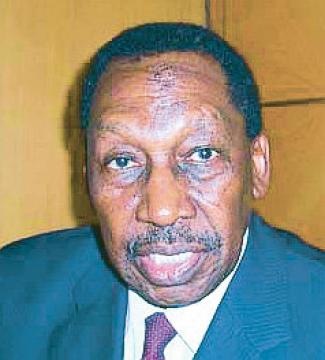
Mohammed Uwais
Former Chief Justice of Nigeria Mohammed Uwais, yesterday, warned that there could be trouble in 2015 if elections do not hold in the troubled states of Adamawa, Yobe and Borno.
Speaking with newsmen in Abuja, while attending a sensitisation workshop with the theme: “Nigeria 2015 Elections and Beyond: Stakeholders Conference on the Roles of the State and Non-State Actors in Mitigating Violence in Elections,” Uwais noted that there could be a “lacuna,” if the Internally Displaced Persons, IDPs, were not allowed to exercise their franchise during the 2015 polls.
“When the Electoral Act was enacted in 2010, this sort of situation of having IDPs was not envisaged, so there is no provision in the law on how to deal with it and the constitution is also silent but the way to go round it is to get the National Assembly to amend the Electoral Act and make provisions to make it possible for the IDPs to exercise their franchise,” Uwais said.
He however advised the National Assembly to amend the electoral act to make room for IDPs to vote.“It all depends, if the National Assembly is willing, it can pass a law within two days, then it goes to the president and the president within a day or two can also assent to the bill.”
Uwais also regretted the non implementation of the report of his Electoral Reform Committee by the Chief Olusegun Obasanjo’s administration. According to him, the implementation of the report would have completely stopped electoral violence in the country.
The former CJN lamented that after wasting his energy, spending sleepless days and nights to come out with a solution for the country’s electoral system, the end result was thrashed by the government.
“It has become a norm in Nigeria that when committees are set up by government and when the committees submit their reports, the reports don’t normally get fully implemented. That is what has also become of what you call the ‘Uwais Committee Report.’
“I don’t feel regret but I feel disturbed because a lot of problems we are facing now could have been solved if some of the recommendations of the committee had been implemented. For instance, this morning, we heard that of 1,000 electoral offences which INEC is given the responsibility to prosecute, they have only been able to do so in respect of only 211.
“Now, if you go back to our report, what we recommended was that there should be a body or agency called Electoral Offences Commission which will be charged with the responsibility of dealing with electoral offences. But that hasn’t been implemented!
“You could see that if that had been done, today, we wouldn’t be talking about INEC not being able to prosecute electoral offenders.”
Asked whether he suspected conspiracy by those in positions of leadership, Uwais said: “I don’t think it is conspiracy as such, but issue of self preservation. A lot of the politicians who are in the National Assembly, that is the Senate and the House of Representatives, who are to create such a body, are themselves co-offenders; maybe even the brains behind the offences. So, they may feel if they do so, they may be shooting themselves in the foot and perhaps, that is why they are not keen about implementing that recommendation.”
Commenting on the ongoing strike by judiciary workers, Uwais said it would affect litigations arising from the 2015 polls.
“Of course, there will be problems for all cases not just election petitions. I don’t know how the problem is going to be solved but from you, the media, I understand meetings have been held with government, through representatives of the government, the Minister of Labour and that an MoU was signed between the union and the labour minister and there is hope that there may be a solution. I am not in the system any more,” he said.
Support InfoStride News' Credible Journalism: Only credible journalism can guarantee a fair, accountable and transparent society, including democracy and government. It involves a lot of efforts and money. We need your support. Click here to Donate
